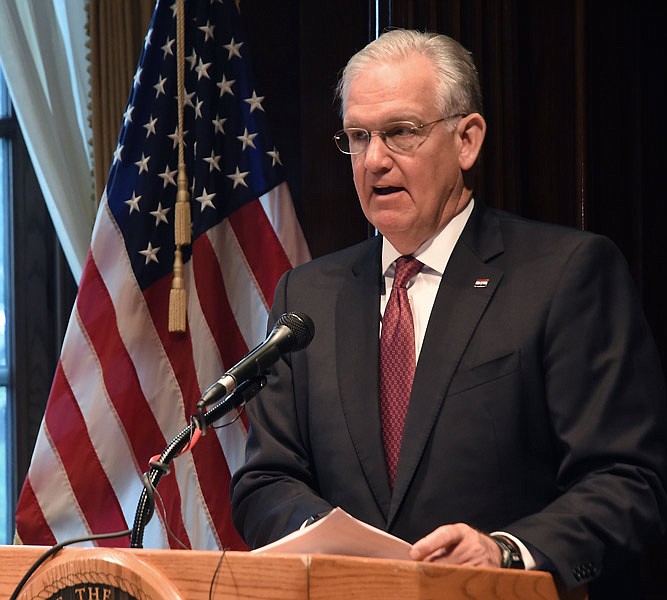In the financial world, a AAA bond rating is the best there is.
It means lower interest rates are needed to repay a debt based on selling bonds, and that can save state and local taxpayers millions of dollars a year.
Only about a half-dozen U.S. states enjoy that best-rating - including Missouri, which has had a AAA bond rating from Standard and Poors since 1962, when Democrat John Dalton was governor.
Moody's has given Missouri the same rating since at least 1973, the first year of Republican Christopher "Kit" Bond's first term as governor.
And Missouri has been rated AAA by the Fitch service since 1989 - the first year the state government applied for a Fitch rating in the first year of Republican Gov. John Ashcroft's second term.
That means Missouri government has been rated AAA for 54 years straight, during the terms of seven Democrats - Dalton, Warren Hearnes, Joseph Teasdale, Mel Carnahan, Roger Wilson, Bob Holden and current Gov. Jay Nixon - and three Republicans - Bond, Ashcroft and Matt Blunt.
"One of the key elements of that AAA rating is that power that we have in our Constitution for the governor to control the rate of spending," Nixon said in 2013. "And that has been used by many governors before me and, I will submit, will be used by governors in the future."
Nixon cited the AAA rating again last week, as he announced $115.5 million in withholdings from the $27 billion budget lawmakers passed last April.
He explained, his withholdings targeted budget areas with new or increased spending rather than cutting into agencies' core budgets.
"Budgets are about priorities," Nixon said several times during a 45-minute news conference Wednesday.
He announced the restrictions after the state's total revenues for the business year that ended June 30 grew at only 0.9 percent instead of the 2.8 percent that had been predicted when the budget was written in the 2015 Legislature.
"(That) means we have less revenue than what the Legislature assumed when it passed the budget for Fiscal Year 2017," which began July 1, the governor said. "Let me emphasize: revenue increased last year - just not as quickly as my administration or the General Assembly anticipated."
Withholdings are not vetoes, where the governor rejects a line-item appropriation.
Instead, they are a freeze, blocking the money from being spent unless the governor releases the money later or lawmakers override a withholding the same way they can override a veto.
Voters two years ago approved adding that legislative power to the state Constitution.
Nixon repeated his concerns lawmakers - especially Republicans - as well as some of the GOP candidates seeking to succeed him in January all want to reduce or eliminate some of the taxes state government imposes.
Tax-cut supporters argue lowering taxes, in the long run, will improve the state's economy, while Nixon and other tax-cut opponents point to Kansas, where deep tax cuts made a couple years ago have caused problems for Kansas' government operations.
"What does drive (business) activity to us," Nixon said, "is our AAA credit rating and the bipartisan way we get our budgets done on time."
He added, "The ratings agencies constantly mention what I'm doing today - which is acting quickly, appropriately (and) maturely, and communicating with people in a timely fashion what we're doing on the budget."
Interim Budget Director Dan Haug agreed.
"We're willing to take these actions," he said. "Some of the other states just sort of don't pay their bills. They don't actually cut back on what they're spending - they just spend it, then don't pay their bills.
"That's not how Missouri's run. That's not what the governor wants to do. So, we'll make the hard decisions when we have to."
Missouri "has a history of making these tough decisions," Haug added. "Every time our AAA bond rating has been re-affirmed by one of the three rating agencies, they have talked about how Missouri uses the power of restricting responsibly to make sure the budget is balanced.
"And that's just not done in some states."
As governor, Nixon has defended Missouri's budget process when the three ratings agencies' experts question the state's ability to keep that top-of-the-line rating.
"It's getting harder every day," the governor said, noting Kansas, Illinois, New Jersey and other states "have been down-graded multiple times at the same time we've been able to keep the 'gold standard' here. It's been getting more difficult."
He thinks the Recession of 2008-09 "brought a whole different attitude (by) ratings agencies, as to how they look at what they do. And they've gotten a lot tougher.
"The bottom line is, there's a lot more oversight. (But) the questions aren't getting any easier."
Legislative term limits - which voters approved in 1992 - also haven't helped, Nixon said, because most lawmakers don't "fully understand the longer-term difficulties of a budget. For example, I think there's a whole lot of people who still think all the money comes in the first day of the tax season - that there's some account out there with the $27 billion in it that we just take money out of."
However, the state government's income stream really "is a moving target all the time," with fluctuations in sales taxes and income tax withholdings that are paid to the state on a monthly or quarterly basis - which is why budgets are built on estimates that don't always come true at the end of the business year.
Nixon - who can't continue as governor next year because of term limits - pledged to work with the Legislature's new budget leaders and whoever is elected as his successor "to do everything we can to keep this rating, but it's getting more difficult."
Related articles:

